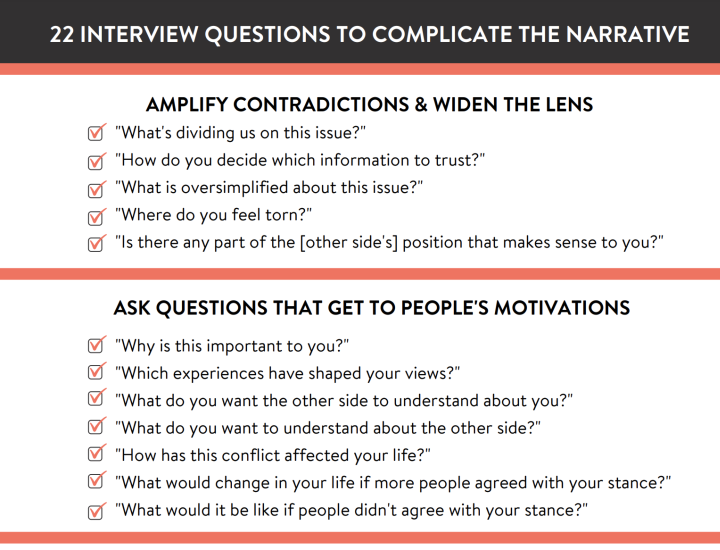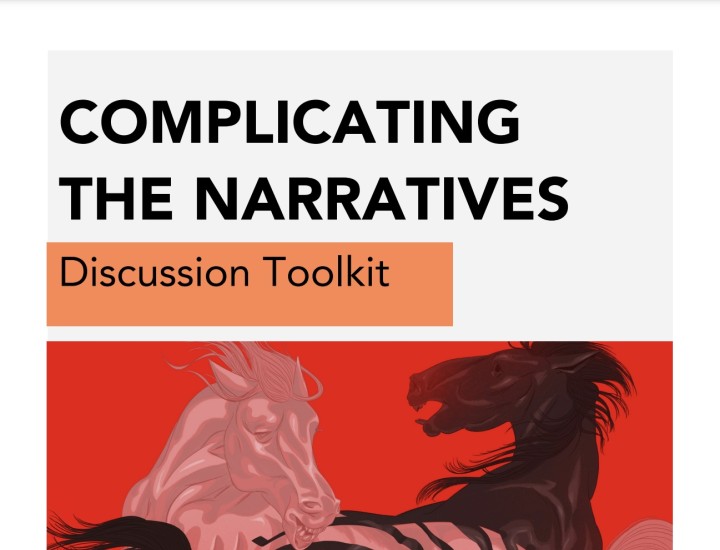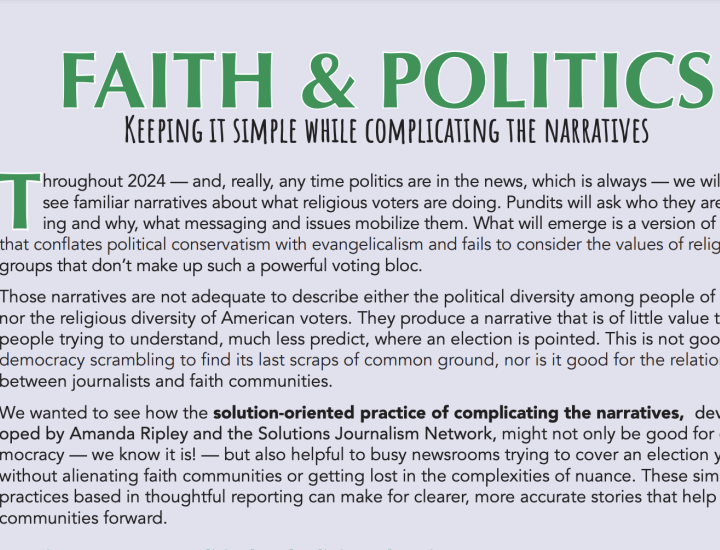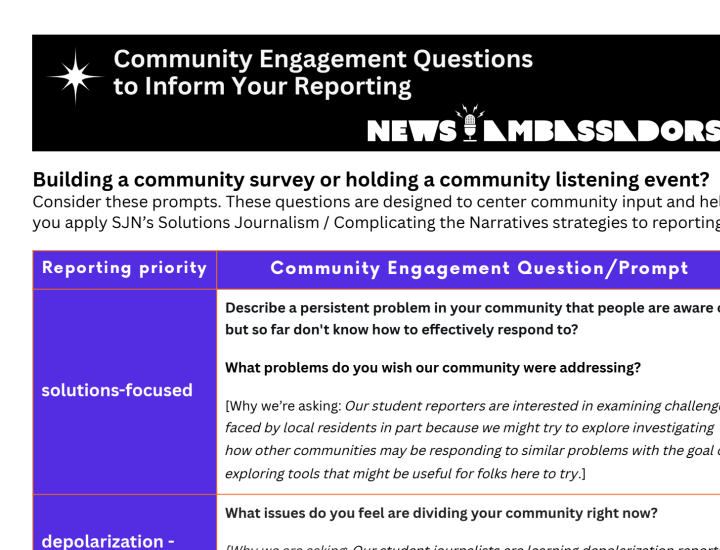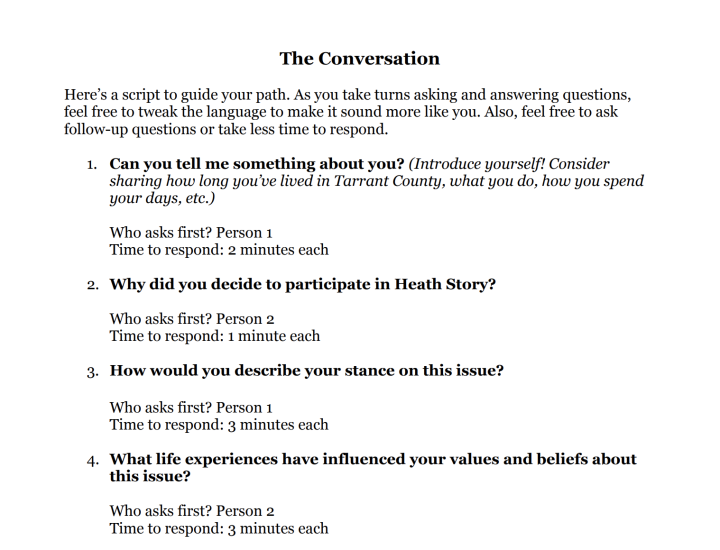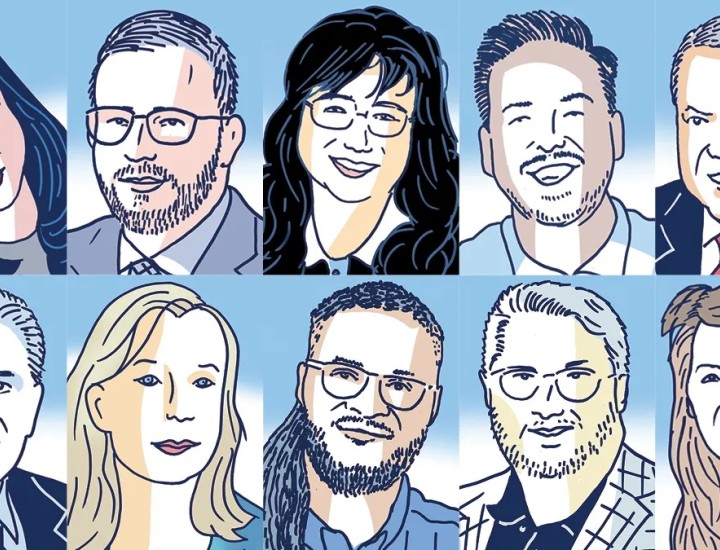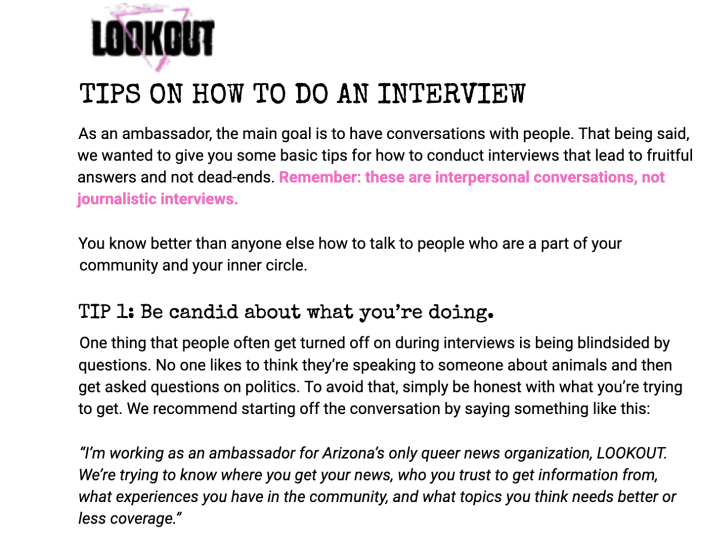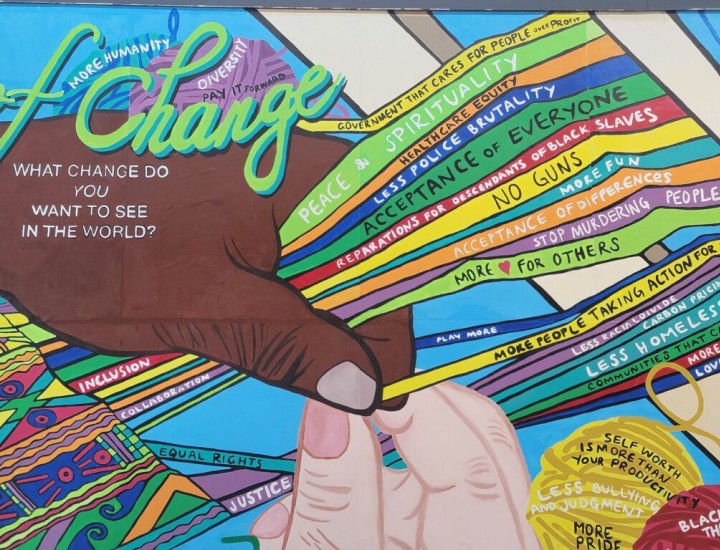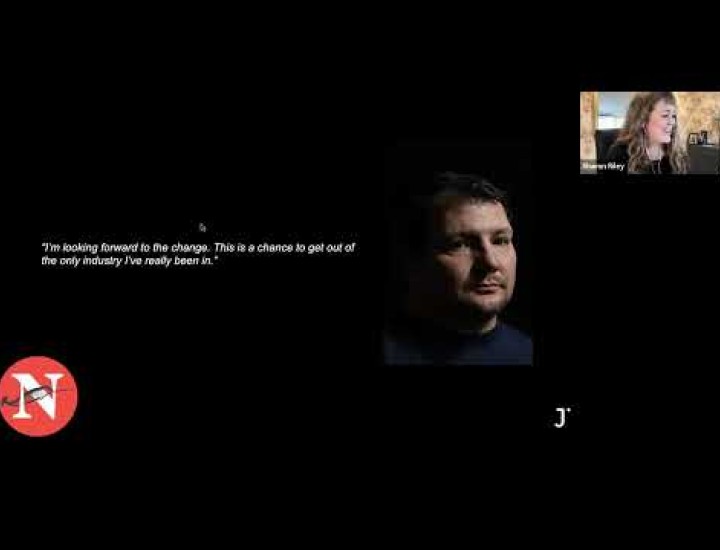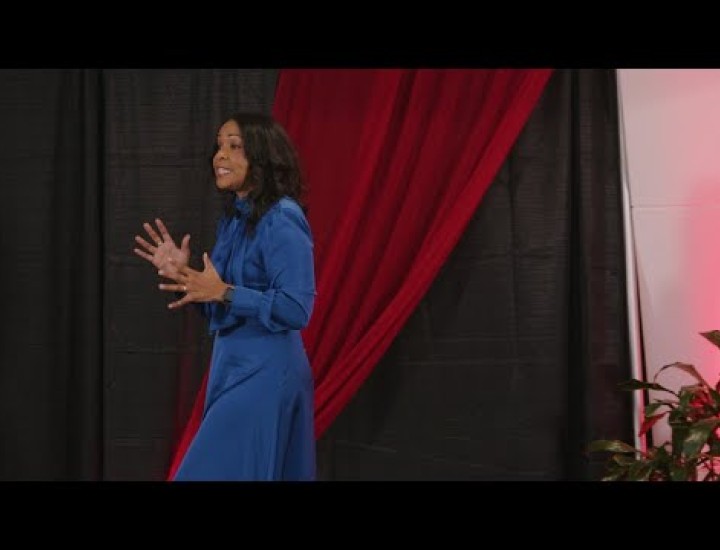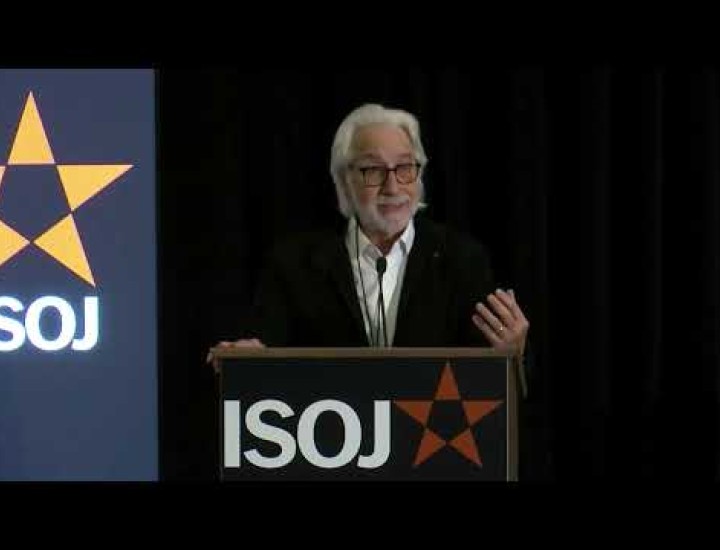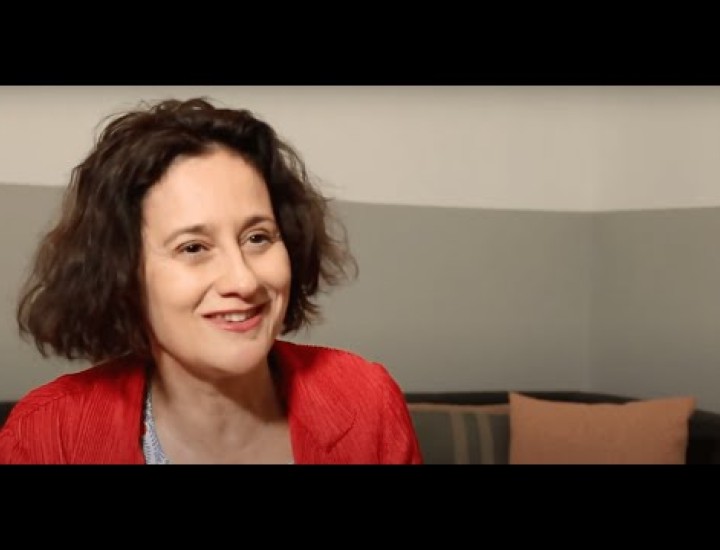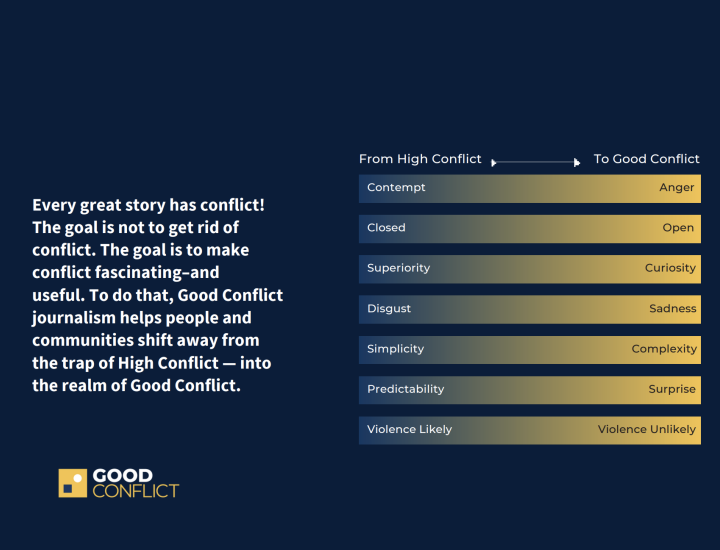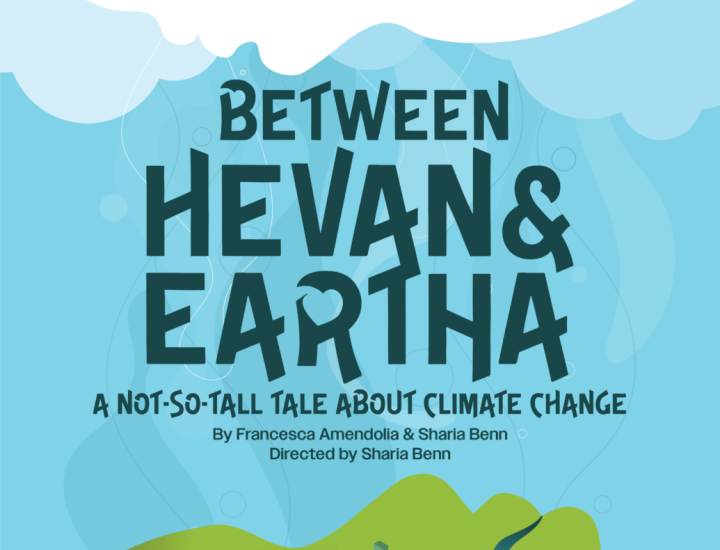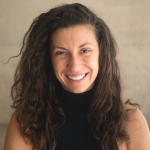Complicating the Narratives
The Complicating the Narratives (CTN) framework helps journalists use conflict mediation techniques to surface deeper truths about the communities they cover and provide greater understanding about issues those communities face. An essay by journalist Amanda Ripley inspires this work.
Learn How to Complicate the Narratives
The Complicating the Narratives framework offers strategies and techniques for telling richer and fuller stories about issues around which there is high conflict. Learn how to listen and go beneath the problem, embrace complexity and counter confirmation bias to reduce polarization and build trust in your reporting.
Start by exploring the self-paced Complicating the Narratives Toolkit and 22 interview questions that are informed by conflict mediation techniques (one of our most popular resources). Then dig deeper by checking out looping prompts and more.
Request a CTN training
Looking to teach your newsroom the tenets of Complicating the Narratives? Tell us about your training needs, and we’ll connect you with one of our network’s CTN trainers.
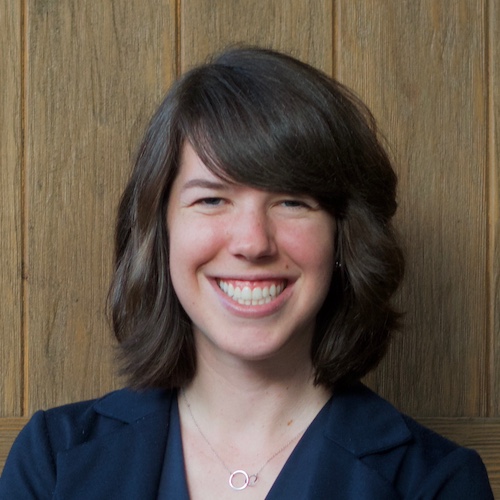 Alexis Allison is an independent journalist and educator. Previously, she covered health for the Fort Worth Report. She has a master’s degree from the Missouri School of Journalism, where she studied data and trauma-informed reporting. For her Complicating the Narratives (CTN) Fellowship with SJN, Alexis produced a monthly podcast in which two people who disagree about a health decision talk to each other.
Alexis Allison is an independent journalist and educator. Previously, she covered health for the Fort Worth Report. She has a master’s degree from the Missouri School of Journalism, where she studied data and trauma-informed reporting. For her Complicating the Narratives (CTN) Fellowship with SJN, Alexis produced a monthly podcast in which two people who disagree about a health decision talk to each other.
 Anastasia Rudenko is the award-winning founder and editor-in-chief of the independent Ukrainian media outlet Rubryka. In 2019-20, with the support of the International Center for Journalists, she became the author of a popular documentary series about environmental problems in Ukraine. Now Rubryka’s team is producing and spreading solution-focused reporting on how Ukrainians are coping with the consequences of war. Anastasia formerly served as a Solutions Journalism Network LEDE Fellow.
Anastasia Rudenko is the award-winning founder and editor-in-chief of the independent Ukrainian media outlet Rubryka. In 2019-20, with the support of the International Center for Journalists, she became the author of a popular documentary series about environmental problems in Ukraine. Now Rubryka’s team is producing and spreading solution-focused reporting on how Ukrainians are coping with the consequences of war. Anastasia formerly served as a Solutions Journalism Network LEDE Fellow.
Anastasia is also an accredited solutions journalism trainer.
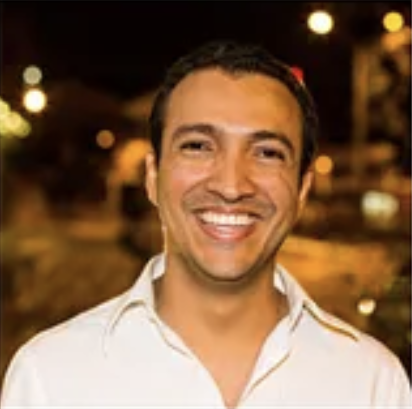 Andrés Felipe Vera Ramírez is the former radio director of Radioperiódico Clarín and former editor of El Mundo in Colombia. Currently, he is a community associate of Acumen Academy, a social change incubator. As a Solutions Journalism Network LEDE Fellow, Andrés applied a systems-thinking approach to solutions journalism in Latin America, unlocking new possibilities for the community actors involved in the solution, journalists who report the stories and audiences who access the stories.
Andrés Felipe Vera Ramírez is the former radio director of Radioperiódico Clarín and former editor of El Mundo in Colombia. Currently, he is a community associate of Acumen Academy, a social change incubator. As a Solutions Journalism Network LEDE Fellow, Andrés applied a systems-thinking approach to solutions journalism in Latin America, unlocking new possibilities for the community actors involved in the solution, journalists who report the stories and audiences who access the stories.
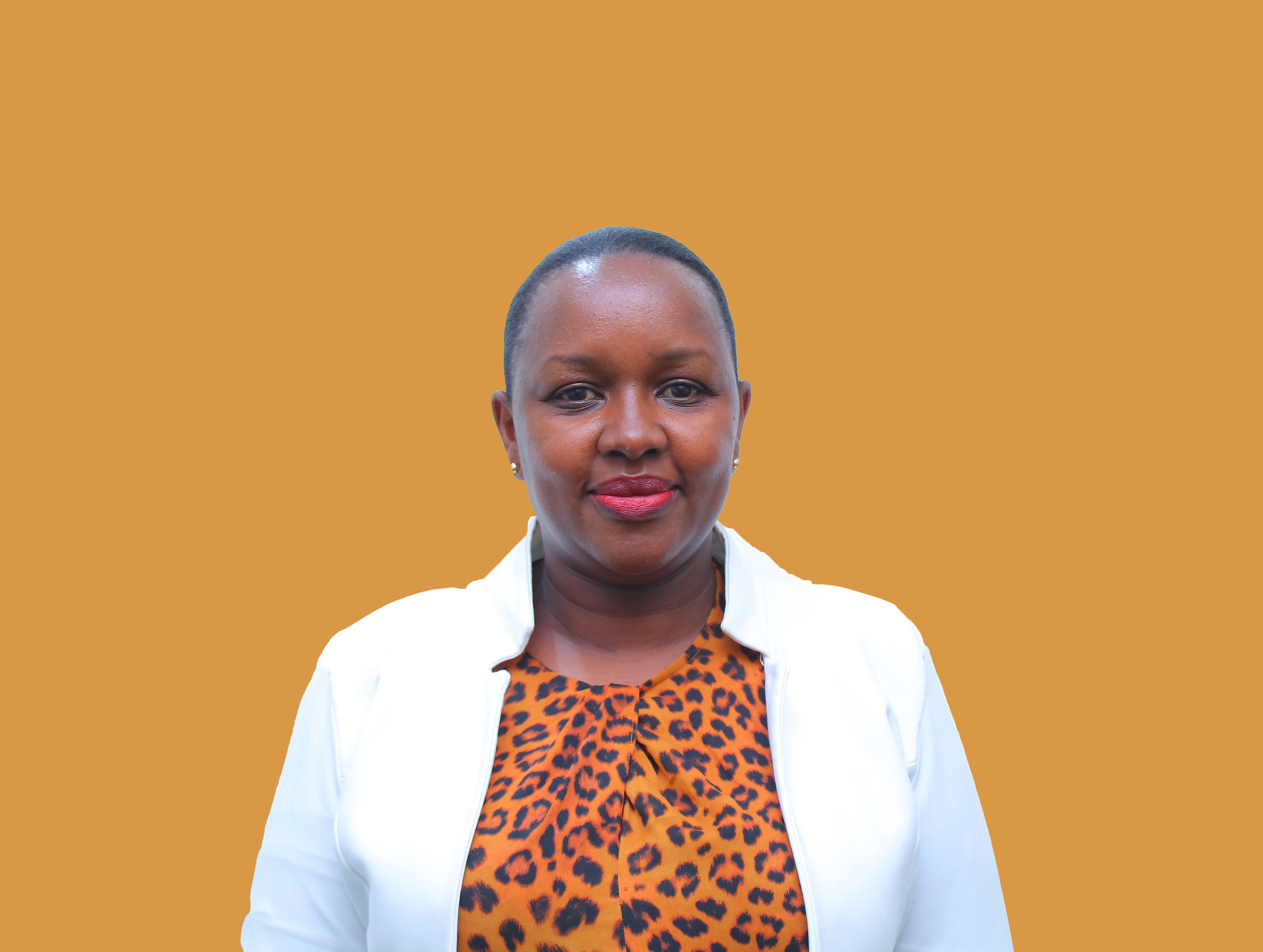
Caroline Karobia is SJN’s Africa Initiative Manager: She collaborates with partners, trainers and journalists in Africa. She led BBC Swahili and Somali services and was the launch editor for the first LIVE TV debates program in Kenya as well as the assistant editor for BBC Africa TV programs. She is experienced in covering the East and Horn of Africa region and takes pride in advocating for editorial policies that prioritize the protection of children’s rights and ensure impartiality.
Caroline is also SJN's Africa Initiative Manager.
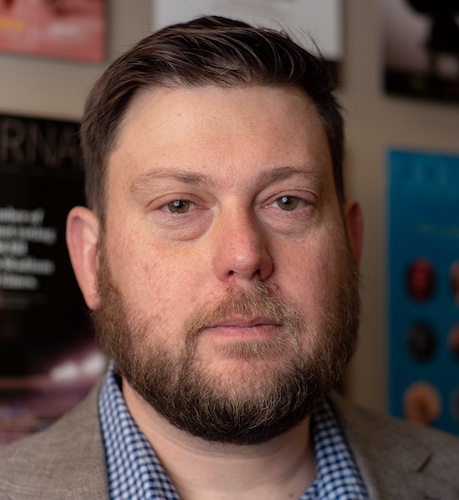 Chris Green blends the techniques of investigative, data, civic and solutions journalism to provide trustworthy information that fuels impactful dialogue. He began his career with Kansas newspapers, first covering local government and then the Kansas Legislature. As the executive editor of The Journal, a civic issues magazine published by the Kansas Leadership Center, he draws on a wide range of influences to shape a nationally award-winning publication that productively tackles hot-button issues. Chris’ CTN Fellowship project sought to complicate the debate around immigration and demographic change in the heartland, and convene folks on all sides of the issue to foster a more productive dialogue on the topic.
Chris Green blends the techniques of investigative, data, civic and solutions journalism to provide trustworthy information that fuels impactful dialogue. He began his career with Kansas newspapers, first covering local government and then the Kansas Legislature. As the executive editor of The Journal, a civic issues magazine published by the Kansas Leadership Center, he draws on a wide range of influences to shape a nationally award-winning publication that productively tackles hot-button issues. Chris’ CTN Fellowship project sought to complicate the debate around immigration and demographic change in the heartland, and convene folks on all sides of the issue to foster a more productive dialogue on the topic.
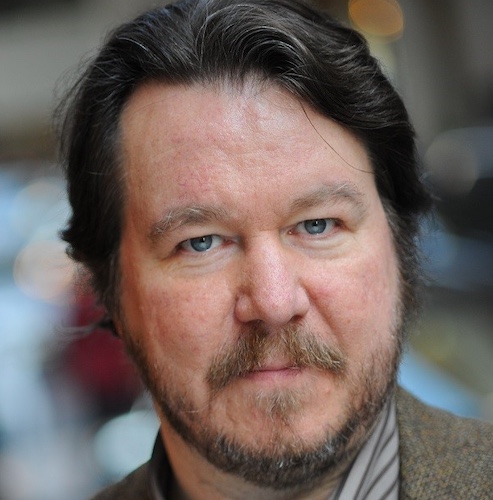 Christopher Johnston has been a freelance journalist for more than 35 years, with articles in The Christian Science Monitor, History Magazine and Scientific American. His book, “Shattering Silences: Strategies to Prevent Sexual Assault, Heal Survivors, and Bring Assailants to Justice” (Skyhorse) was published in 2018. He is a member of the board of the American Society of Journalists and Authors, and teaches creative nonfiction at Cleveland State University. For his CTN Fellowship project, Christopher facilitated CTN-guided discussions with the sex worker community on legalizing sex work (prostitution).
Christopher Johnston has been a freelance journalist for more than 35 years, with articles in The Christian Science Monitor, History Magazine and Scientific American. His book, “Shattering Silences: Strategies to Prevent Sexual Assault, Heal Survivors, and Bring Assailants to Justice” (Skyhorse) was published in 2018. He is a member of the board of the American Society of Journalists and Authors, and teaches creative nonfiction at Cleveland State University. For his CTN Fellowship project, Christopher facilitated CTN-guided discussions with the sex worker community on legalizing sex work (prostitution).
 Colleen Hagerty is an independent multimedia journalist specializing in disaster coverage. She’s reported extensively on policies, key players and impacted communities in this space for outlets including The New York Times, The Guardian, The Washington Post and Popular Science. She also has a disaster-focused newsletter, My World’s on Fire, which was shortlisted for a 2022 Covering Climate Now award. During her CTN Fellowship, Colleen investigated how climate change, politics and community concerns are complicating the implementation of prescribed fire, a key tool in mitigating the current wildfire crisis.
Colleen Hagerty is an independent multimedia journalist specializing in disaster coverage. She’s reported extensively on policies, key players and impacted communities in this space for outlets including The New York Times, The Guardian, The Washington Post and Popular Science. She also has a disaster-focused newsletter, My World’s on Fire, which was shortlisted for a 2022 Covering Climate Now award. During her CTN Fellowship, Colleen investigated how climate change, politics and community concerns are complicating the implementation of prescribed fire, a key tool in mitigating the current wildfire crisis.
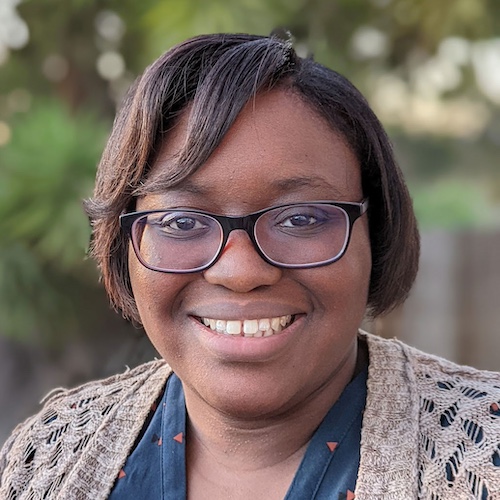 Dana Amihere is a data journalist, designer and developer. She’s the founder/executive director of AfroLA, a nonprofit newsroom covering Greater Los Angeles through the lens of the Black community. Previously, Dana worked in data, interactive design and news apps for KPCC/LAist, The Dallas Morning News, Pew Research Center and The Baltimore Sun. For her CTN Fellowship, Dana produced a CTN-informed, solutions-focused series for and with Los Angeles’ most vulnerable groups.
Dana Amihere is a data journalist, designer and developer. She’s the founder/executive director of AfroLA, a nonprofit newsroom covering Greater Los Angeles through the lens of the Black community. Previously, Dana worked in data, interactive design and news apps for KPCC/LAist, The Dallas Morning News, Pew Research Center and The Baltimore Sun. For her CTN Fellowship, Dana produced a CTN-informed, solutions-focused series for and with Los Angeles’ most vulnerable groups.
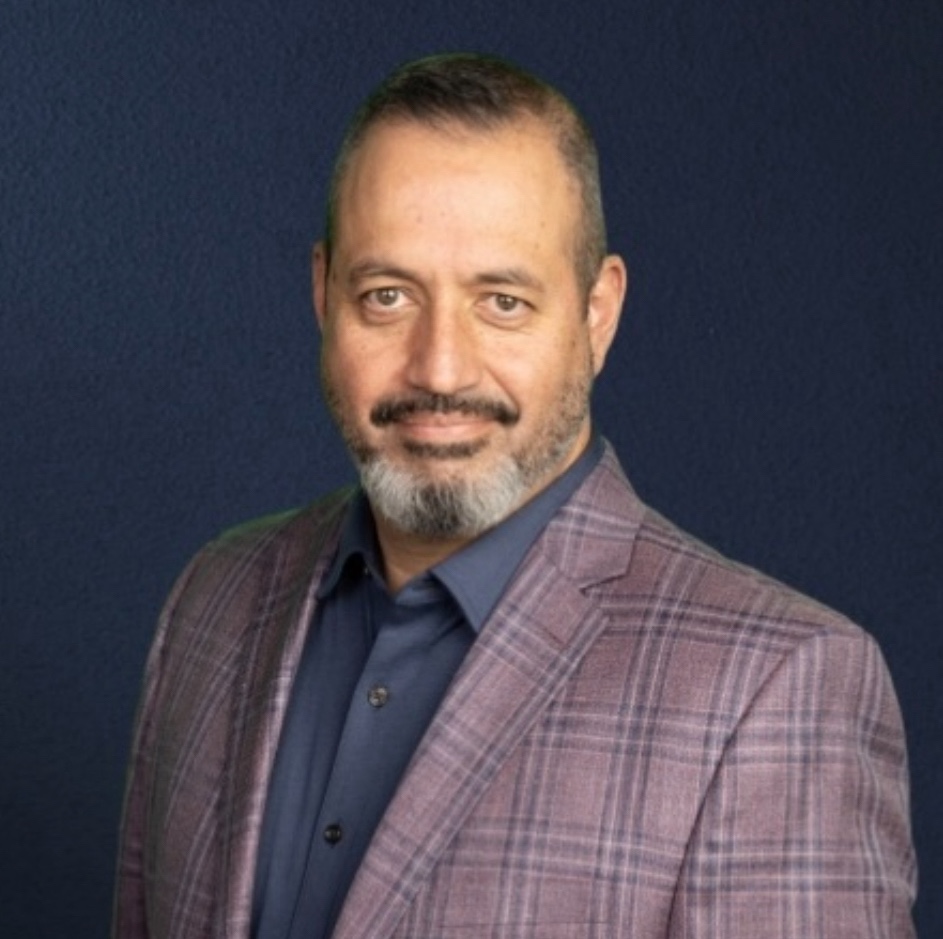 Hugo Balta is Executive Editor of The Fulcrum, a daily cross-partisan news publication that engages citizens in evolving government to better meet the needs of all people. Hugo is also the Publisher of the Latino News Network (LNN), a multiplatform digital news outlet of eight local and national sites focusing on coverage of the social determinants of health and democracy. His award-winning career experience spans multiple markets and platforms, including leadership positions with MSNBC, NBCUniversal, Telemundo, CBS and ABC News.
Hugo Balta is Executive Editor of The Fulcrum, a daily cross-partisan news publication that engages citizens in evolving government to better meet the needs of all people. Hugo is also the Publisher of the Latino News Network (LNN), a multiplatform digital news outlet of eight local and national sites focusing on coverage of the social determinants of health and democracy. His award-winning career experience spans multiple markets and platforms, including leadership positions with MSNBC, NBCUniversal, Telemundo, CBS and ABC News.
Hugo is the only person elected twice as President of the National Association of Hispanic Journalists (NAHJ) in the organization's more than 40-year history and was inducted into its Hall of Fame in 2016. He is an adjunct professor of journalism at the University of Washington and Columbia College Chicago and an accredited solutions journalism trainer with the Solutions Journalism Network (SJN).
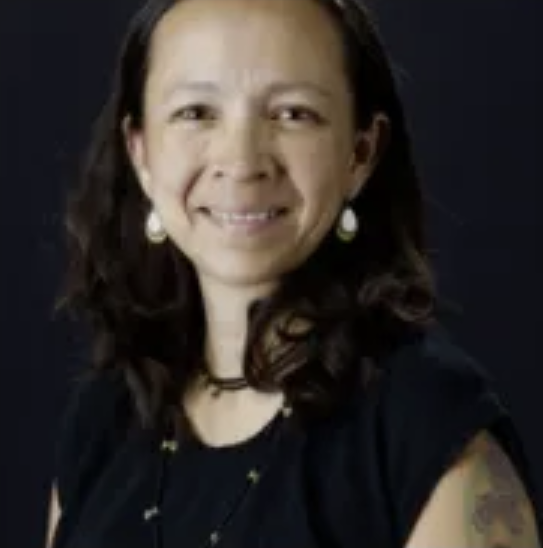 Mónica Quesada Cordero is an award-winning photojournalist with 15 years of experience developing photographic projects in editorial, portraiture, wildlife, food and architecture. In addition, she has experience in writing and reporting and a master’s degree in audiovisual and multimedia production. Mónica is the co-founder of El Colectivo 506, a media organization that empowers, supports and connects voices throughout Costa Rica, especially in rural areas, through solutions journalism.
Mónica Quesada Cordero is an award-winning photojournalist with 15 years of experience developing photographic projects in editorial, portraiture, wildlife, food and architecture. In addition, she has experience in writing and reporting and a master’s degree in audiovisual and multimedia production. Mónica is the co-founder of El Colectivo 506, a media organization that empowers, supports and connects voices throughout Costa Rica, especially in rural areas, through solutions journalism.
 Paula Díaz Levi is a science and environmental journalist from Chile. She has worked as a science journalist at the international marine conservation organization Oceana, and also at the Institute of Ecology and Biodiversity (IEB), a research center focused on biodiversity sciences. Her experience includes publishing for Chilean media such as Ladera Sur and international media such as El País. She has also worked in book publishing and other projects. Paula has participated in international events and training programs, including a grant from the prestigious science journal Nature (Springer Nature) to attend the World Conference of Science Journalists in Medellín, Colombia (2023); the Kiplinger Fellowship, organized by Ohio University (2022); a scholarship to participate in the World Conference of Science Journalists, organized by the World Federation of Science Journalists in Switzerland (2019); and the Environmental Reporting Workshop of the Knight Center for Environmental Journalism of Michigan State University (2018).
Paula Díaz Levi is a science and environmental journalist from Chile. She has worked as a science journalist at the international marine conservation organization Oceana, and also at the Institute of Ecology and Biodiversity (IEB), a research center focused on biodiversity sciences. Her experience includes publishing for Chilean media such as Ladera Sur and international media such as El País. She has also worked in book publishing and other projects. Paula has participated in international events and training programs, including a grant from the prestigious science journal Nature (Springer Nature) to attend the World Conference of Science Journalists in Medellín, Colombia (2023); the Kiplinger Fellowship, organized by Ohio University (2022); a scholarship to participate in the World Conference of Science Journalists, organized by the World Federation of Science Journalists in Switzerland (2019); and the Environmental Reporting Workshop of the Knight Center for Environmental Journalism of Michigan State University (2018).
 Peter Lindner is the head of projects and research at the Bonn Institute. He worked at the German national daily Süddeutsche Zeitung for a long time, spending almost 12 years as head of the politics section and more than six years as deputy editor-in-chief of SZ.de. He focused on new approaches to journalism and developed several digital formats and projects, such as the SZ “Werkstatt Demokratie” (democracy workshop). In 2022, he worked on “Listen Louder” at the Constructive Institute, housed at Denmark’s University of Aarhus, where he researched approaches to how journalism can promote constructive dialogue in society. He studied political science, sociology and psychology in Munich and Bradford, England.
Peter Lindner is the head of projects and research at the Bonn Institute. He worked at the German national daily Süddeutsche Zeitung for a long time, spending almost 12 years as head of the politics section and more than six years as deputy editor-in-chief of SZ.de. He focused on new approaches to journalism and developed several digital formats and projects, such as the SZ “Werkstatt Demokratie” (democracy workshop). In 2022, he worked on “Listen Louder” at the Constructive Institute, housed at Denmark’s University of Aarhus, where he researched approaches to how journalism can promote constructive dialogue in society. He studied political science, sociology and psychology in Munich and Bradford, England.
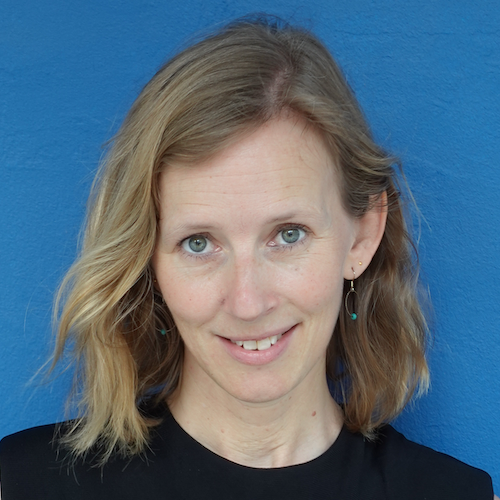 Sanne Breimer is a freelance project manager, adviser and journalism trainer for international media organizations, including SembraMedia, Thomson Reuters Foundation, European Journalism Centre, Thibi and the Asia-Pacific Broadcasting Union (ABU). Sanne works remotely and divides her time between Europe and Southeast Asia. She founded Inclusive Journalism, a nonprofit organization aiming to educate primarily Western journalists about media representation and decolonization through a weekly newsletter, online courses and retreats. Before moving into training, Sanne worked at a managerial level in national public broadcasting in the Netherlands for almost 13 years, focusing on radio, digital media and innovation. She is Dutch with Frisian roots.
Sanne Breimer is a freelance project manager, adviser and journalism trainer for international media organizations, including SembraMedia, Thomson Reuters Foundation, European Journalism Centre, Thibi and the Asia-Pacific Broadcasting Union (ABU). Sanne works remotely and divides her time between Europe and Southeast Asia. She founded Inclusive Journalism, a nonprofit organization aiming to educate primarily Western journalists about media representation and decolonization through a weekly newsletter, online courses and retreats. Before moving into training, Sanne worked at a managerial level in national public broadcasting in the Netherlands for almost 13 years, focusing on radio, digital media and innovation. She is Dutch with Frisian roots.
Sanne is also an accredited solutions journalism trainer.
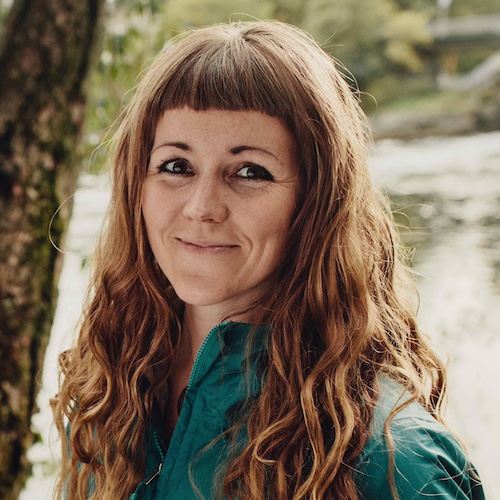 Sharon Riley is an award-winning journalist and the Prairies bureau chief at The Narwhal, a nonprofit online news magazine covering issues related to energy and the environment, where she has worked for six years. Her writing has also been published by The Walrus, Harper’s Magazine, The Tyee and Maisonneuve, among others. Sharon was born and raised in rural Alberta, and if she’s not at her computer, she’s probably in the Rocky Mountains with her family.
Sharon Riley is an award-winning journalist and the Prairies bureau chief at The Narwhal, a nonprofit online news magazine covering issues related to energy and the environment, where she has worked for six years. Her writing has also been published by The Walrus, Harper’s Magazine, The Tyee and Maisonneuve, among others. Sharon was born and raised in rural Alberta, and if she’s not at her computer, she’s probably in the Rocky Mountains with her family.
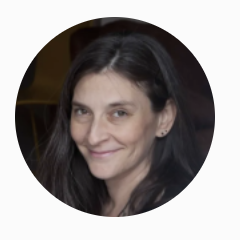 Shia Levitt is the director of News Ambassadors, a project that links student reporters in one location with counterparts in a politically or geographically dissimilar location for collaborative, CTN-informed solutions reporting.
Shia Levitt is the director of News Ambassadors, a project that links student reporters in one location with counterparts in a politically or geographically dissimilar location for collaborative, CTN-informed solutions reporting.
Levitt is a public radio journalist who has reported for NPR, Marketplace and other outlets from the US, Asia, Africa and the Middle East. In 2022, she was a News Editor at KALW and mentor for their Audio Academy Fellows program. In addition to reporting and producing, Levitt has taught radio journalism both at the college level and to teens, including for WNYC’s Radio Rookies, for UNICEF in Haiti, and at Mills College, Brooklyn College and Queens College. She is also a 2023–2024 Complicating the Narratives Fellow with SJN.
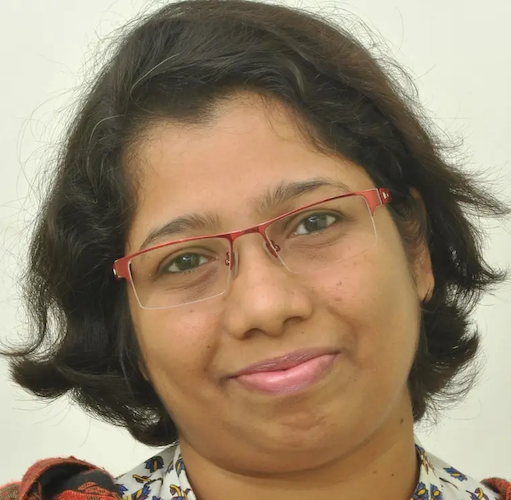 Swati Sanyal Tarafdar is an independent journalist with bylines in international publications including The Guardian, Teen Vogue, Ozy and the BMJ. She covers social justice, women in sports, and the environment from Vijayawada, India. For her LEDE Fellowship, she produced “What Can We Do?” — a multimedia series for YouTube covering SoJo stories on social and climate justice, and stories at the intersection of livelihood, health and the environment specifically for young adults in India.
Swati Sanyal Tarafdar is an independent journalist with bylines in international publications including The Guardian, Teen Vogue, Ozy and the BMJ. She covers social justice, women in sports, and the environment from Vijayawada, India. For her LEDE Fellowship, she produced “What Can We Do?” — a multimedia series for YouTube covering SoJo stories on social and climate justice, and stories at the intersection of livelihood, health and the environment specifically for young adults in India.
Swati is also an accredited solutions journalism trainer.
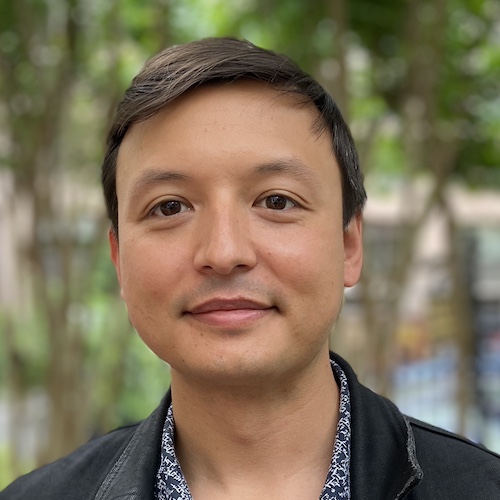 Will Schick is director of programs and partnerships at the Asian American Journalists Association. Previously, he was the editor-in-chief of Street Sense Media, a weekly street paper based in Washington. For the past several years, Will has reported on housing, homelessness and social programs. Prior to becoming a journalist, he served for 11 years in the Marine Corps.
Will Schick is director of programs and partnerships at the Asian American Journalists Association. Previously, he was the editor-in-chief of Street Sense Media, a weekly street paper based in Washington. For the past several years, Will has reported on housing, homelessness and social programs. Prior to becoming a journalist, he served for 11 years in the Marine Corps.
Stories and Conversations that Complicate the Narratives
Inspired by Amanda Ripley’s landmark essay of the same name, the solutions stories in this collection "complicate the narrative" through listening, trust-building and working across divides to uncover more authentic solutions to these divisive problems.
The following stories and conversations facilitated by CTN fellows stand as stellar examples of what happens when journalists use looping, deep listening and other CTN-informed tools to surface deeper truths and provide greater understanding about contentious issues.
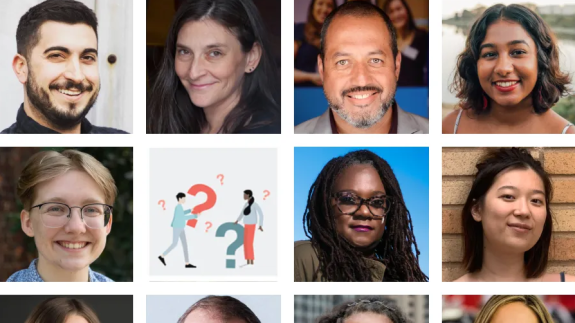
CTN Fellows
As the United States grapples with worsening polarization and seemingly intractable conflict, Complicating the Narratives (CTN) Fellows — U.S. journalists, representing a wide variety of geographies and communities — used CTN techniques to report on solutions to some of the nation’s most divisive issues, with communities historically misrepresented by media and misunderstood by audiences.
Learn about the 2023 and 2022 fellows, and read the solutions journalism stories their projects have catalyzed in this collection.


